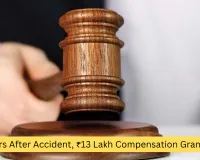Cash Scandal: Centre Moves to Remove Justice Yashwant Verma
Digital Desk

In the wake of a cash scandal, the Central government has accelerated the process to remove Justice Yashwant Verma from his post. A formal proposal is being prepared for introduction in Parliament.
The central government is preparing to introduce a proposal in Parliament to remove former Delhi High Court judge Justice Yashwant Verma from his post, which can be presented in the upcoming monsoon session. According to sources, many MPs of opposition parties have indicated to support this proposal, which has increased the possibility that the proposal can get the required majority. It is noteworthy that burnt notes were recovered in several sacks from Justice Yashwant's official residence.
According to Article 124 (4) of the Constitution of India, a judge of the Supreme Court or High Court can be removed only on the basis of misbehavior or incapacity. For this, it is mandatory to pass a resolution in both the houses of Parliament, which requires the support of at least 100 MPs in the Lok Sabha and 50 MPs in the Rajya Sabha. Apart from this, the proposal should be approved by a two-thirds majority of the total number of members in both the houses.
The Supreme Court had constituted an in-house committee to investigate the matter, which included the Chief Justices of Punjab-Haryana and Himachal Pradesh High Courts along with a senior judge of the Karnataka High Court. The committee recorded the statements of more than 50 witnesses, and after the completion of the investigation, the then Chief Justice Justice Sanjeev Khanna recommended the removal of the President and the Prime Minister. Now the government is preparing to bring a proposal in Parliament on the basis of the same report.
What is the next process?
1. The proposal will be presented in Parliament.
2. The Speaker of the Lok Sabha or the Chairman of the Rajya Sabha can approve this proposal.
3. After this, Parliament will constitute a three-member inquiry committee under the Judges Inquiry Act, 1968.
4. Voting will be done in both the houses on the basis of the committee's report.
The motion to remove the judge will be presented in Parliament
Under the Judges (Inquiry) Act, 1968, when a motion to remove a judge is accepted in a House, the Speaker or Chairman constitutes a three-member committee. This committee will investigate the reasons on the basis of which impeachment has been sought against the judge. The committee consists of the Chief Justice of India, the Chief Justice of one of the 25 High Courts and a distinguished jurist. Rijiju said that since this matter is related to corruption in the judiciary, the government wants all political parties to participate in it.



.png)
.png)
.png)
.png)
.png)

.png)

.png)
